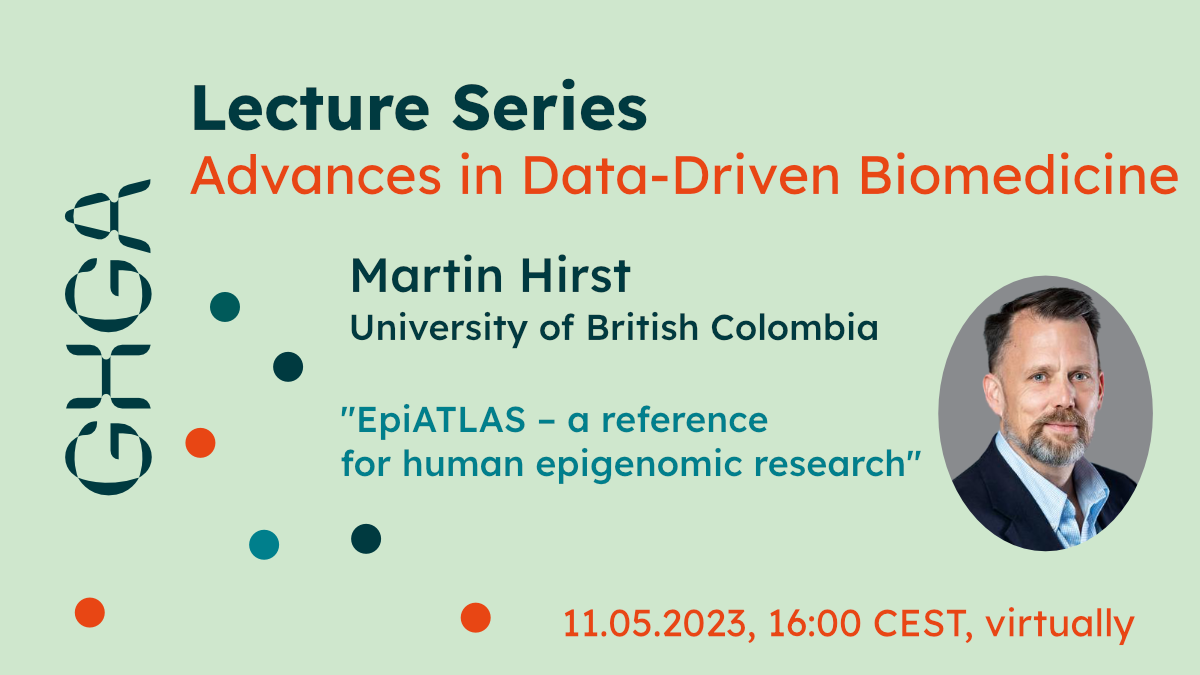GHGA Lecture Series: Martin Hirst (virtual)
- 11 May 2023
Martin Hirst from the University of British Columbia (UBC) talked about "THe EpiATLAS – a reference for human epigenomic research" at the GHGA lecture series ("Advances in Data-Driven Biomedicine") on May 11, 2023.
Watch this lecture here.
Abstract:
The sequence of the human genome provides a foundation for understanding cellular processes in health and disease. However, the way in which this primary genetic information is organized within the cell also plays a critical role in its interpretation and execution. Epigenetic processes are essential for packaging and higher-level organization of the genome and thus are fundamental to normal development and cell differentiation, and are increasingly recognized as being involved in human disease.
Motivated by a desire to provide a foundation from which to build an understanding of normal epigenome states leading scientists and research funding agency representatives founded the International Human Epigenome Consortium (IHEC) in the fall of 2010. The primary goals of IHEC are to define and coordinate the production of reference maps of human epigenomes for key cellular states relevant to health and diseases, to facilitate rapid distribution of the data to the research community, and to accelerate translation of this new knowledge to improve human health. A critical component of IHEC in reaching these goals was to coordinate the development of common bioinformatics standards, data models and analytical tools to organize, integrate and display large quantities of epigenomic data. One such example is the Epigenome Reference Registry (EpiRR). Beyond supporting IHEC, the EpiRR (www.ebi.ac.uk/vg/epirr) and associated metadata standards and validator (github.com/IHEC) provides a mechanism to allow for the accessioning of protected human subject datasets and enables open searching of de-identified sample and experimental datasets.
Since its inception IHEC members have generated epigenomic datasets from over 2600 human subjects including 346 complete reference epigenomes from a wide variety of primary human tissues and cells. Building our initial Roadmap (Nature 2015, Cell 2016) these data have been uniformly processed using containerized workflows and linked to standardized metadata to generate an EpiATLAS. In this talk I will overview the EpiATLAS, the standardized structures developed to support it and its application in human health.
Biography:
Dr. Hirst is a Distinguished Scientist and Head of Epigenomics at Canada’s Michael Smith Genome Sciences Centre at BC Cancer, Professor in the Department of Microbiology and Immunology and Associate Director of the Michael Smith Laboratory at the University of British Columbia (UBC).
His research focuses on understanding epigenetic dysfunction in cancer and his laboratory develops experimental and computational tools to characterize normal and transformed cell types down to the single cell level. He applies these tools to explore the epigenomic states of normal and transformed cell types to discover and exploit therapeutic vulnerabilities.
Over the last decade, he has led the development of an internationally recognized epigenomic research program at BC Cancer and UBC. He leads the Centre of Epigenomic Mapping Technologies (CEMT) that represents one of two Canadian epigenomic mapping centres funded as part of the CIHR signature initiative: the Canadian Epigenetics, Environment and Health Research Consortium (CEEHRC). Dr. Hirst chairs the Scientific Steering Committee of the International Human Epigenome Consortium (ihec.org) and leads the Canadian Epigenetics, Environment and Health Research Consortium Network (epigenomes.ca) with a mandate to drive epigenetic research in Canada and internationally. Dr. Hirst received a TFRI New Investigator Award (2015) and UBC Killam Research Prize (2018) and has been cited over 48,000 times (Clarivate, 2018 Highly Cited Researcher).






